Giving your Siberian Husky the right food is key for their health. These dogs are full of energy and need a special diet to stay fit and happy. Knowing what they need to eat is very important, whether you’re new to husky parenting or not.
I want to tell you about Max, a happy Siberian Husky who loves adventures. One day, Max went hiking with his owner, Sarah. They enjoyed the mountains, but soon Max began to slow down.
Sarah noticed Max was not his usual self and stopped. She realized she forgot enough food and water. This lack of nutrition made Max tired. It was a big reminder for Sarah about how vital a good diet is for Max.
- Feeding your Siberian Husky a balanced diet is crucial for their overall health and well-being.
- Siberian Huskies have specific nutritional requirements due to their active nature and metabolism.
- Proper nutrition ensures that your Siberian Husky has the energy to maintain their active lifestyle.
- Remember to provide clean and fresh water for your husky to stay hydrated.
- Consult with a veterinarian for guidance on the best diet for your Siberian Husky.
Types of Diets for Siberian Huskies
Siberian huskies need diets that match their unique needs. You can feed them raw food, commercial dog food, or both. Choosing the right food is key to their health.
Some husky owners prefer raw foods because they’re nutritious and healthy. Raw diets can be ready-made or homemade. They are designed to emulate a natural diet with raw meats, bones, fruits, and veggies. This provides huskies with essential nutrients.
When mixing raw and commercial dog foods, don’t give them in the same meal. They digest at different rates, which might upset your husky’s stomach. Feed them a few hours apart instead.
Certain foods are harmful to Siberian Huskies. Never feed them grapes, onions, or chocolate. These can be toxic and cause major health issues. Always talk to a vet or nutrition expert to make safe diet choices for your husky.
Benefits of a Raw Diet for Siberian Huskies:
- Enhanced digestion
- Improved skin and coat health
- Higher energy levels
- Stronger immune system
- Fresher breath
It’s crucial to feed your Siberian Husky well for their health and happiness. Whether you choose raw food, commercial food, or a mix, focus on their nutritional needs. Consulting with professionals helps you make informed choices. A well-nourished husky is a joy to have around!
Feeding Schedule for Huskies
Keeping a regular feeding schedule is key for your Siberian Husky’s health and happiness. This routine helps make sure they get the right amount of food at the best times. Doing so keeps them healthy and content.
It’s wise to feed your Husky either two hours before or after they exercise. This step avoids stomach problems like gastric torsion. Gastric torsion can happen if dogs eat right before or after being very active.
Splitting your Husky’s food into two or three meals per day is good for their stomach and mind. Spread out meals help them avoid boredom and stay lively. They use energy looking for and eating their food.
Huskies eat less than many other dog breeds. It’s because they have a different metabolism. They stop eating when they’re not hungry anymore. So, you should give them food based on how hungry they feel and how much energy they use.
With a well-planned feeding schedule, your Husky will eat a balanced diet and have a proper weight. Always feel free to get advice from your vet. They can offer tailored tips to meet your Husky’s food needs.
Tips for Feeding Your Husky:
- Establish a fixed feeding schedule that aligns with your Husky’s exercise routine.
- Wait for at least two hours before or after physical activity to feed your Husky.
- Divide their daily food intake into two or three equal servings to prevent boredom and promote an active lifestyle.
- Adjust portion sizes based on your Husky’s individual appetite and energy needs.
- Monitor your Husky’s weight and overall health to ensure they are receiving the right amount of food.
Remember, a well-regulated feeding schedule and appropriate portion sizes are key to promoting optimal health and longevity in your beloved Husky.
Nutritional Requirements of Huskies
Huskies need a balanced diet for best health and energy. It’s vital to meet their nutritional needs. Their diet should have the right mix of protein, fats, and carbs.
Protein Requirements for Huskies
Protein is key for muscle growth and repair in huskies. It helps keep their immune system strong. Chicken, beef, and fish are great protein sources for them. It’s crucial to include high-quality protein for their busy lifestyle.
Fat Requirements for Huskies
Fats give huskies much-needed energy. They keep their skin and coat healthy. Adding healthy fats like fish oil helps their joints. It’s key to balance fat intake to avoid health issues.
Carbohydrate Requirements for Huskies
Carbs give huskies energy for their activities. Whole grains and veggies are good carb sources. Including carbs helps them stay active all day.
Huskies’ diet needs can change with their age and how active they are. It’s wise to talk to a vet to figure out what they need. They can help make a diet plan that’s just right.
A balanced diet is essential for your husky’s health. A mix of protein, fats, and carbs supports their energy and growth. It makes sure they are happy and full of life.
Feeding Fruits and Vegetables to Huskies
Offering fruits and vegetables to your Siberian Husky can boost their health. These foods are loaded with vitamins and antioxidants. Plus, they’re low-calorie treats your husky will enjoy.
Best fruits for Huskies:
- Apples: These are full of fiber and vitamin C, making them a top snack choice.
- Blueberries: They’re full of antioxidants which help keep your Husky healthy.
- Oranges: With lots of vitamin C, oranges are a juicy treat for your pet.
Best vegetables for Huskies:
- Broccoli: It’s very nutritious, offering many vitamins and minerals to support your Husky’s health.
- Carrots: They are good for your Husky’s eyesight and can be fun to chew on.
- Green Beans: These are low in calories but high in fiber, making a healthy snack for your dog.
Some fruits and vegetables aren’t safe for Huskies to eat. Avoid grapes and onions as they can be harmful.
“Adding fruits and veggies to your Husky’s meals can boost their health. But, remember to steer clear of harmful ones like grapes and onions.”
Adding various fruits and vegetables can improve your Husky’s diet. Always check with your vet before making any dietary changes for your dog.
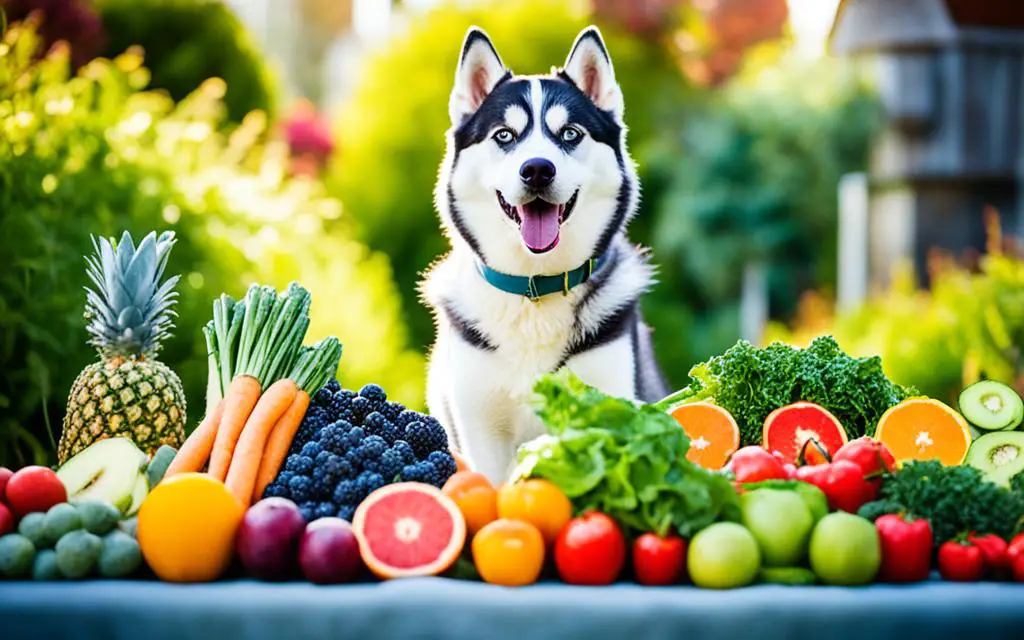
Importance of Water in a Husky’s Diet
Huskies are lively pets that need lots of water for their health. Water helps them do many vital body functions. It’s a must for their diet.
Hydration is key for huskies to stay active and avoid getting too hot or tired. It’s important to give them clean, fresh water all the time. This is especially true when they exercise or when it’s warm out. Make sure your husky can get to water whenever they need.
Water also keeps a husky cool by helping control their body temperature. With their thick fur, they can get hot quickly. Drinking plenty of water helps them stay cool and avoid heat-related problems.
For digesting food well, huskies need water. It breaks down their food and helps their bodies absorb nutrients. Enough water means good digestion and prevents tummy troubles.
It’s also vital that the water they drink is clean. Check the water’s quality often to make sure it’s safe. Using filtered water can lower health risks from bad water.
Benefits of Water in a Husky’s Diet
| Benefits | Details |
|---|---|
| Hydration | Prevents dehydration and supports physical activity |
| Temperature Regulation | Helps prevent overheating and related health issues |
| Digestion | Aids in proper digestion and nutrient absorption |
| Water Quality | Ensuring clean and safe water for consumption |
Please note that in case of any concerns or specific dietary requirements for your husky, it is always recommended to consult with a veterinarian.
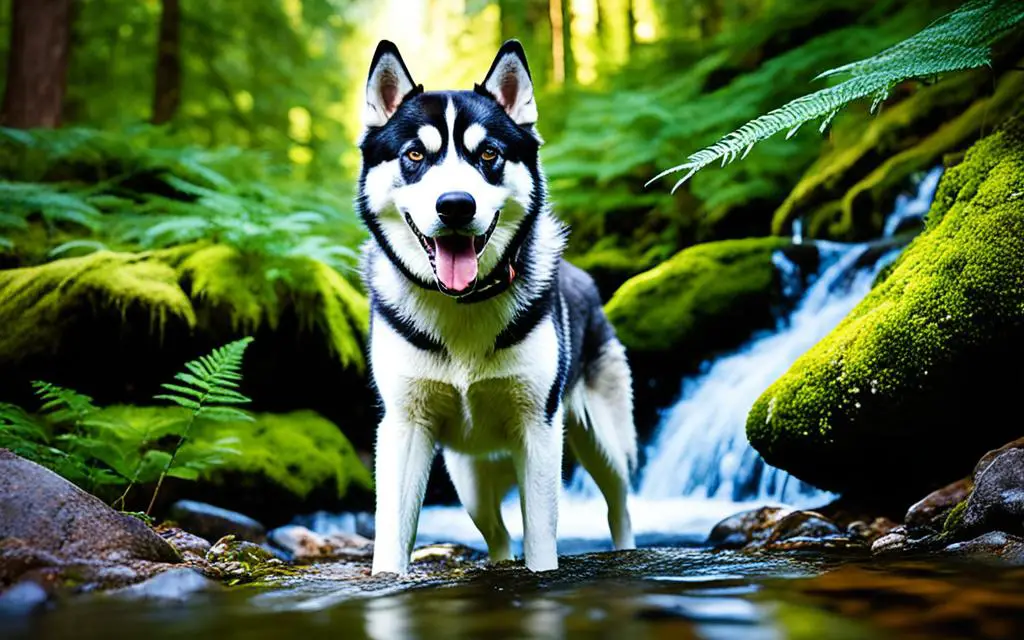
It’s crucial to always give your husky clean water. Keep fresh water available, watch the quality, and encourage them to drink regularly. This keeps them healthy and happy.
Choosing the Right Food for Your Husky
Feeding your Siberian Husky comes with many options. Each has its pros and cons. It’s vital to think about several things before you decide.
Kibble might be your best bet for convenience and saving money. It’s widely available, offers many flavors, and lasts a long time. Always pick high-quality kibble made for Siberian Huskies to meet their dietary needs.
Canned food is another choice. It might cost more than kibble, but it’s tastier for fussy eaters and has more water. Be sure to select canned food designed for huskies that fulfills their nutrition needs.
If you want full control over your husky’s meals, think about homemade food. This way, you can give them fresh, balanced meals without unwanted extras. Yet, it’s crucial to talk to a vet or a pet nutrition expert to make sure your home-cooked meals are nutritious enough.
In choosing the right food for your Husky, consider things like cost, brand trustworthiness, ingredient quality, and where it’s sold. Think about your husky’s energy levels and any health issues. Always remember, huskies need lots of protein and healthy fats.
Feeding Your Husky
Huskies need a fixed feeding schedule. Adjust their food based on their unique needs. Keep an eye on their weight and health to make sure they eat right. Huskies with health issues or special needs might need specific supplements.
Feeding tips for Huskies:
- Consistent schedule: Set a regular feeding routine. It aids digestion and stops overeating.
- Portion control: Tailor food amounts to your husky’s age, activity, and metabolism. Food makers’ guidelines are a good base, but adjust as needed.
- Monitor weight: Watch your husky’s weight to keep them in shape. Change food amounts if necessary.
- Healthy treats: Choose low-calorie, dog-safe treats. Steer clear of harmful table scraps.
Portion sizes for Huskies:
| Weight Range | Recommended Daily Portion |
|---|---|
| 20-30 pounds | 1-2 cups |
| 30-40 pounds | 2-2.5 cups |
| 40-50 pounds | 2.5-3 cups |
| 50-60 pounds | 3-3.5 cups |
These are just general ideas. Your husky’s actual needs might be different. Talk to your vet to figure out the right food amounts and schedule.
Special considerations for Huskies with health conditions:
If your husky has health issues like allergies or obesity, you’ll need to pay extra attention to their diet. It’s crucial to work with your vet or a nutrition expert. They can help create a diet plan that’s just right for your husky.
“Good nutrition is key to keeping your husky healthy. By following these tips and adjusting food amounts for their needs, your husky will stay fit and happy.”
Conclusion
A balanced diet is key for your Siberian Husky’s health and joy. The right food is vital for their well-being. They have special dietary needs that differ with age, how active they are, and their health.
Choosing fitting food and proper nutrition helps avoid health problems. This ensures they have a long and healthy life. Keep an eye on their weight and health to check if their food amount is right.
Always provide clean, fresh water for your Husky. Water is essential for their health, aiding in digestion and keeping their body temperature right. A right diet, along with enough water, greatly supports their health.

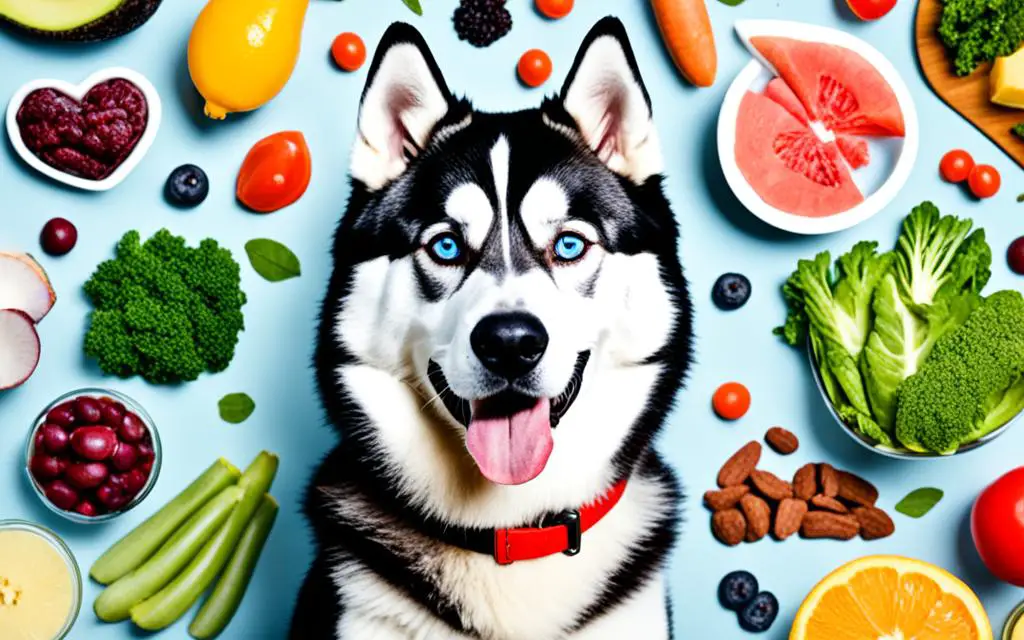
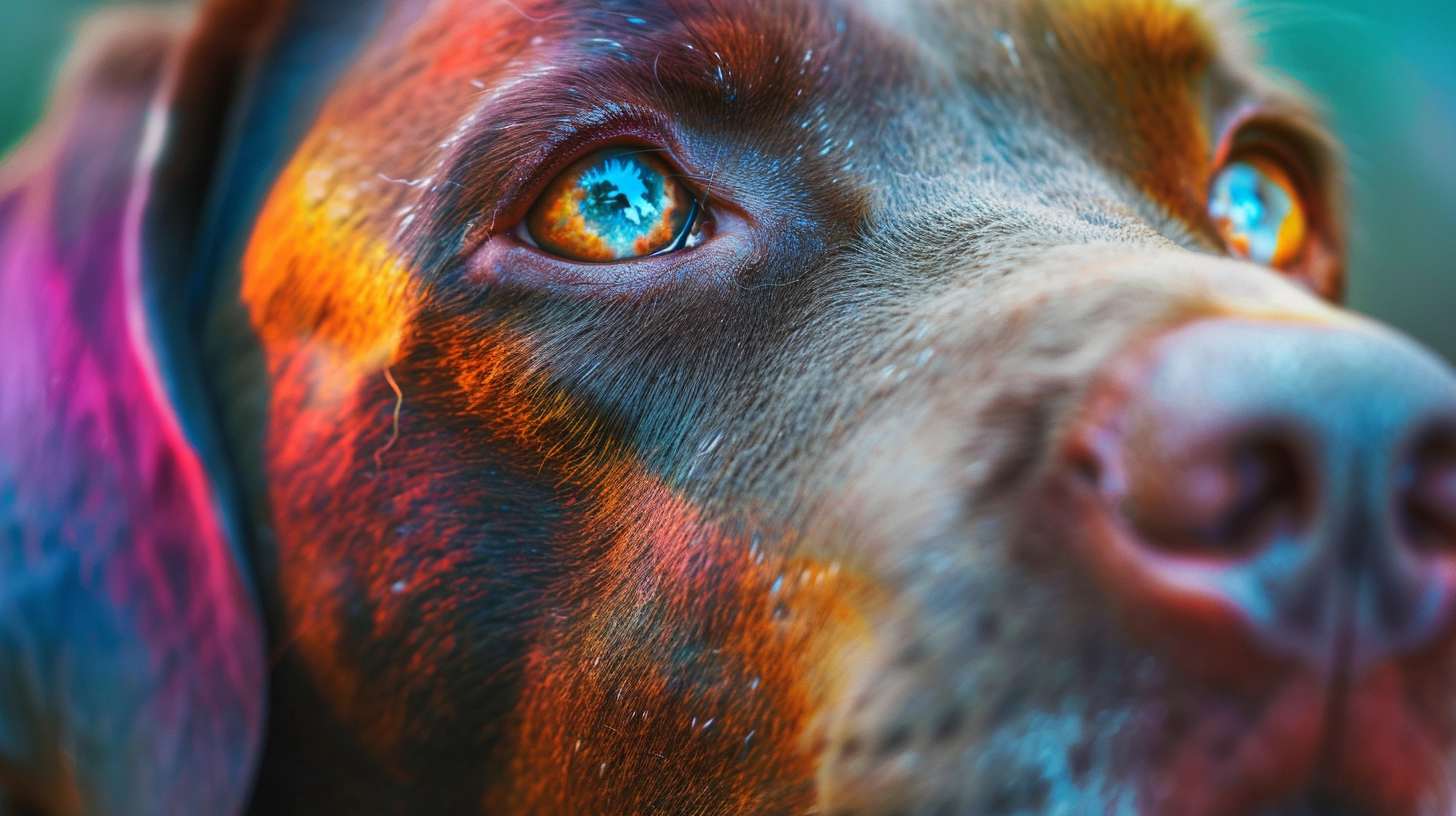

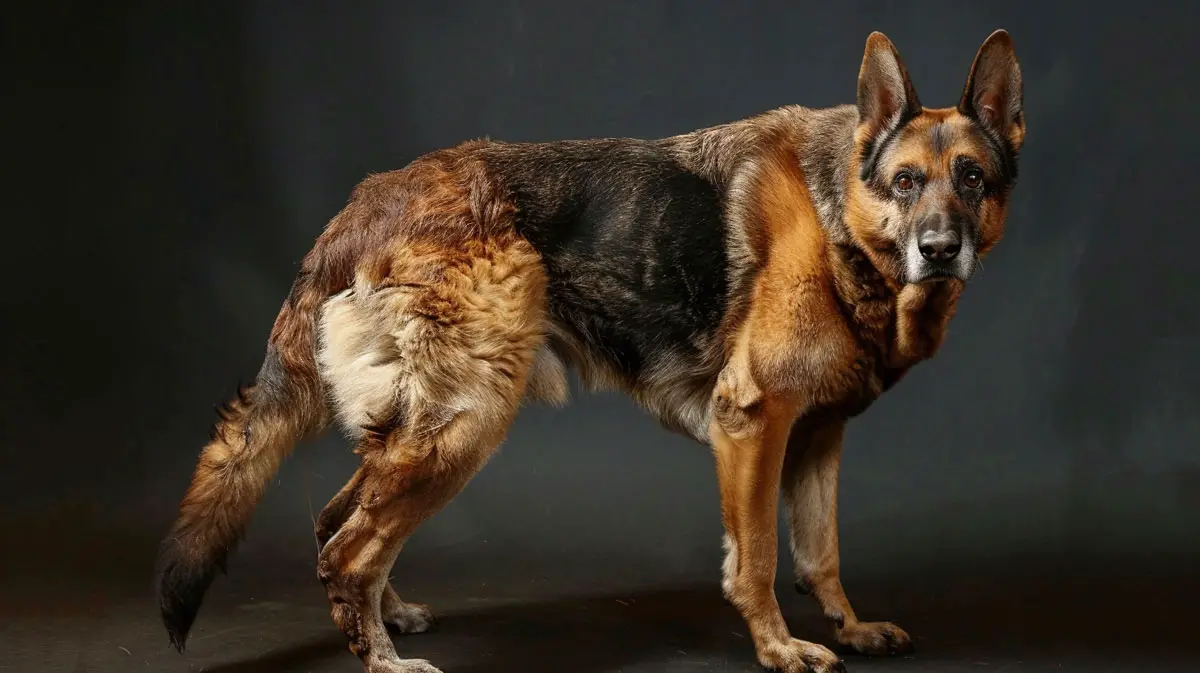
Leave a Reply